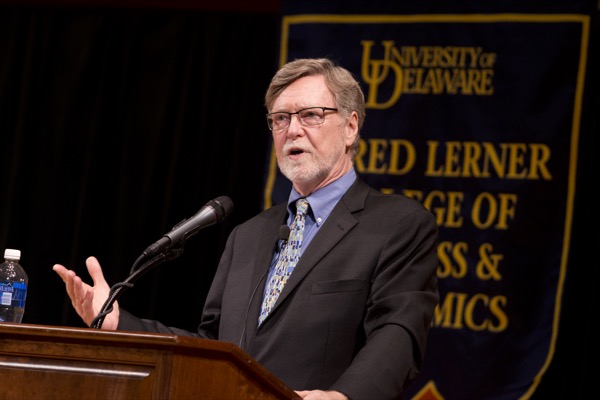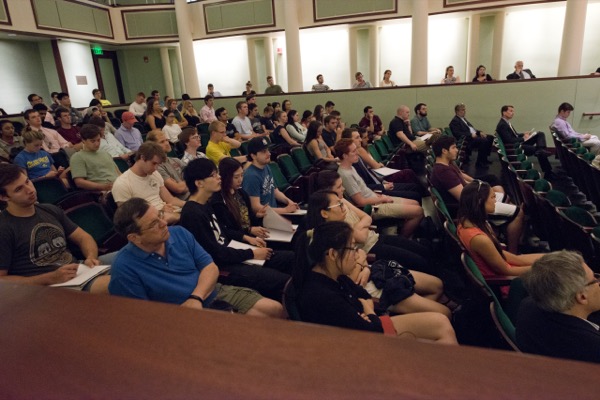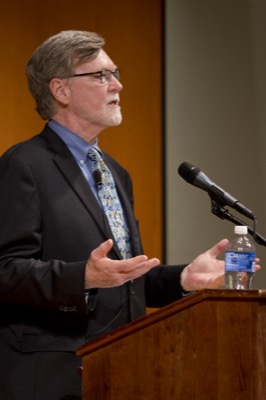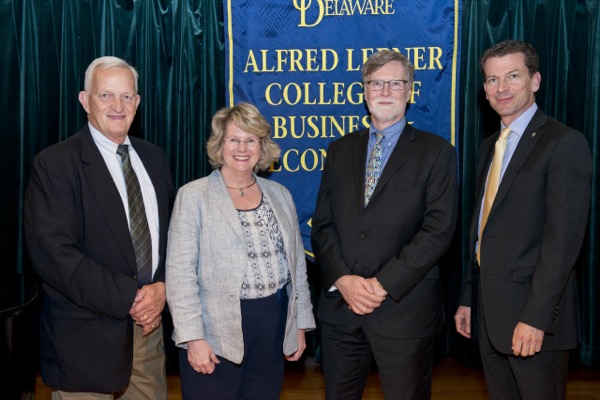


Protecting investors
SEC's Flannery discusses important investment issues of present, future
4:24 p.m., May 27, 2015--The protection of investors in complex and sometimes perilous markets was the subject of the University of Delaware’s 25th annual Hutchinson Lecture in Economics, presented by Mark J. Flannery of the Securities and Exchange Commission (SEC).
Flannery, who serves as director and chief economist of the SEC’s Division of Economic and Risk Analysis, discussed investor protection and the closely related subject of capital formation with a diverse audience of UD community members and visitors.
People Stories
'Resilience Engineering'
Reviresco June run
But first Flannery took the audience on a “short tour of the SEC,” describing the commission’s organization, methods and mission.
One of the key goals in that mission, Flannery said, is ensuring that investors are able to “fend for themselves.” This means that investors should both understand the potential risks and rewards of an investment and be able to afford any losses they might face.
These investors, usually individuals but at times small companies, are known as accredited investors. Since 1983, regulations require that accredited investors have $200,000 in income or $1 million in net worth, but Flannery said that inflation rates have caused the number of accredited investors to grow sharply.
“We’ve gone from about 1.5 percent of all U.S. households in 1983 to about 12 percent of households today being characterized as accredited investors,” Flannery said.
But that growth in income, he added, might not reflect a growth in investment competence.
“Have we gotten a lot smarter?” Flannery asked. Are these investors “more able to fend for themselves than 30 years ago?”
The SEC, he said, is studying this question now in the hopes of determining whether the standards for accredited investors should be raised to include a smaller percentage of the population.
But Flannery suggested that changing technology could impact the answer as well. Robo-advisers, he said, which provide low-cost personalized information on how, what and why to buy, could be changing the game.
“Maybe robo-advisers have changed the information available to people, so the fact that we now have 12 percent accredited under the old standard after inflation is actually OK,” he said.
These topics all harken back to important central questions, Flannery continued.
“Who should we protect?” he asked. “Who needs to be protected because they can’t fend for themselves?”
But regulators should remember, he continued, “that protection is going to be relatively expensive for offering companies.” This is where he said the subject of investor protection intertwines with that of capital formation for small enterprises.
“So the question is: How do we balance the protection of investors against the fixed cost of providing lots of information that would make even unaccredited investors able to make informed investment decisions?”
Regulatory bodies, he continued, must “compare and weigh the value of protecting unaccredited investors against the social value of allowing small companies to raise securities more cheaply.”
In the coming years, he said, the direction of this policy will be determined both by what the companies prefer and by whether potential investors feel that they’re receiving enough information to make informed decisions.
After his presentation, Flannery took questions from the audience on topical questions like the avoidance of Ponzi schemes, the risks of utilizing clearinghouses and the role of big data in research.
Dean Bruce Weber of UD’s Alfred Lerner College of Business and Economics said that the college was honored to host Flannery at this year’s Hutchinson Lecture.
“Dr. Flannery is one of the leading academic experts on regulatory policy in the financial sector, and is putting his expertise to use at the SEC by overseeing rule-making initiatives that are improving the U.S. capital markets,” Weber said.
“Accessible to non-economists, the lecture highlighted how good regulatory policy must balance the cost of compliance with the benefits of helping innovative, early-stage companies raise capital,” he continued.
James Butkiewicz, professor and chair of UD’s Department of Economics, agreed that Flannery’s remarks were concise and clear to community members with varying levels of expertise.
“Dr. Flannery’s remarks gave students and faculty greater insight into the financial regulatory process,” Butkiewicz said.
About the Hutchinson Lecture in Economics
The Department of Economics at the Lerner College established the Hutchinson Lecture in Economics in 1990 to honor the distinguished academic career of the late Harry D. Hutchinson.
Hutchinson received his doctorate in economics from the University of Michigan and taught in the economics department from 1959 until his retirement in 1989. His career was defined by excellence in teaching and scholarship, especially in macroeconomics.
Hutchinson’s very successful textbook, Money, Banking and The U.S. Economy, was the foundation for many students’ introduction to financial institutions.
Each year a distinguished scholar and policy-maker in the area of macroeconomics or monetary policy is invited to UD to present the Hutchinson Lecture on a topic of current interest in banking and/or finance.
Recent previous lecturers include William L. Wascher, deputy director of the Federal Reserve Board’s Research and Statistics Division; Michael C. Jensen, Jesse Isidor Strauss Professor Emeritus at Harvard University; and Warren Coats of the International Monetary Fund.
Article by Sunny Rosen
Photos by Lane McLaughlin











